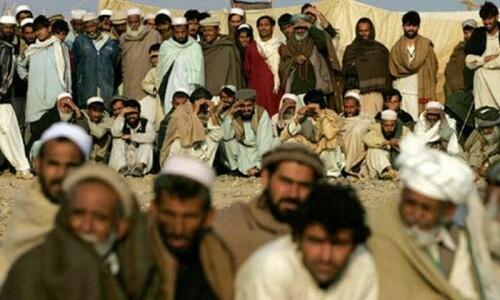ON the face of it, the numbers appear impressive. A briefing on the Karachi operation, given by a Sindh Rangers official to the Senate Standing Committee on Interior, stated that the Rangers had conducted 3,696 raids, arrested 6,835 suspects and seized 5,214 weapons during the first year of the initiative.
Although the briefing, which claimed that the operation had wiped out the TTP network in Karachi, was coy on details of the crackdown’s impact on various categories of criminal offences, police officials have often been quoted as saying the operation has brought down crime by 50pc, with the steepest drop in murders committed along political or ethnic lines. But Karachi is complex and Machiavellian, and has multiple stakeholders with often conflicting agendas.
Hence, these claims need to be placed in context to understand the larger picture and gauge whether the gains are sustainable.
While the decline in political/ethnic murders has indeed been marked, developments at home and abroad may have also played a role in reducing friction between political activists inclined to ‘robust’ means of conflict resolution.
For one thing, in the months following the 2013 elections, the main parties in Karachi, perhaps feeling vulnerable with a heavily mandated PML-N asserting its writ at the centre, made attempts to bridge their differences and these efforts culminated in their joining forces to run the province. This has been a fraught year for the MQM anyway with legal problems dogging its leader in London.
Meanwhile, nearly 400 raids on the People’s Amn Committee during the course of the operation have brought down large-scale, gang-related violence in Lyari, but it is relevant to point out that almost as soon as the operation began, the gangs’ top tier leadership fled the area — some, intriguingly, even made it abroad.
As for breaking the back of the TTP in Karachi, the briefing stated that the Rangers had arrested 760 terrorists in 403 raids on militant hideouts, but a cursory glance at newspapers on most days shows that sectarian killers — one faction of whom is said to be closely associated with the TTP — are going about their business without let or hindrance.
Of late, relatives of prominent ulema have also been targeted, indicating a degree of planning which points to the existence of determined, well-organised gangs. Given these realities, it will take nothing less than a holistic approach — involving systemic, far-reaching reforms — to grapple with the criminal landscape of Karachi.
Published in Dawn, October 1st, 2014














































